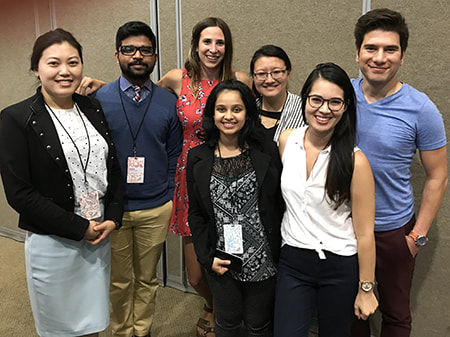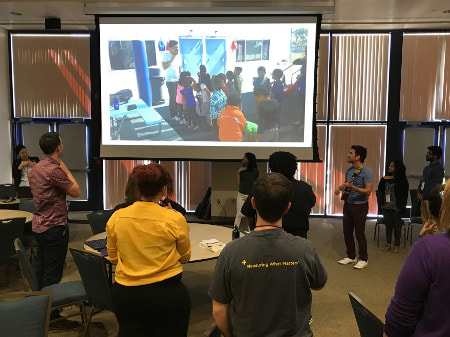|
UCI student presenters discussed their research and engaged the audience in digital games during their presentation at the 2017 Digital Media and Learning Conference. Their presentation title was Media and Technology for Cognitive Enhancement throughout the Lifespan.
Presenters: Grace Lin, Shafee Mohammed, Emily Sumner, Snigdha Kamarsu, Minnie Wu, Chelsea Parlett, Robert Kalinowski Presentation Description The field of cognitive sciences has increasingly embraced the use of media and technology in assessing and enhancing people’s cognitive skills. This panel presents an interdisciplinary approach to bridge cognitive sciences, digital media/technology, and learning sciences. We first introduce our kid-friendly cognitive assessments (e.g., Child Risk Utility Measure), highlighting the affordances and contributions of digital media in understanding children’s thinking. Established cognitive measures tend to be aesthetically unappealing to children, and often fail to take into account their cognitive limitations. Digital media and technological tools allowed us to circumvent this issue by making cognitive tests into games that children enjoy. We then discuss four research studies which use media and technology to help improve various cognitive functions. The first seeks to improve preschoolers’ spatial reasoning ability through songs and dance that emphasize spatial vocabulary and gesturing. The second aims to improve kindergartners’ numerical knowledge through digital games meant to train children’s domain-general executive function skills or domain-specific number sense. The third targets preteens with ADHD and aims to improve working memory and inhibition processes through scaffolding within a memory game. Finally, digital training games are not limited to children; tablet games also prove to be a crucial instrument for enhancing older adults’ performance on working memory tasks. Together, these studies emphasize the versatility of digital media and technology in improving people’s learning and learning abilities in individuals of all ages. We close with an overview into further insights our aggregate data can provide. Specifically, analyses of data from similar media-and-game training studies can help pinpoint individual characteristics that allow people to benefit from the games. In the future, we hope that understanding individual differences through these analyses can help inform personalization of learning. Titles and Presenters A freshly baked perspective on how we measure risk propensity in children, Emily Sumner Gametizing Cognitive Tests, Grace Lin A Song of Space and Kids to Go “Above, Above, Above”, Robert Kalinowski Improving Mathematics through Playing Games, Grace Lin & Snigdha Kamarsu Improving Working Memory and Assessing Motivation to Play, Minnie Wu Benefits of Tablet-Based Brain Training in Older Adults, Chelsea Parlett Can Machine Learning help predict Working Memory Training Gains?, Shafee Mohammed Comments are closed.
|
Resources for:
|
|



